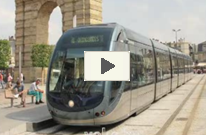Kitchener, Waterloo, Cambridge: Is region on the right track?
A new study ranks 94 possible options for better public transit in Waterloo Region. Leading the list is a rapid-rail system with a first-phase cost of more than $300 million.
By Jeff Outhit and Kevin Swayze
(Published in The Record on January 8, 2008.)
Costly electric trains are strongly favoured over cheaper buses in the latest study on a proposed rapid transit system.
Planners have now ranked 94 options for dozens of possible routes still under review in Kitchener, Waterloo and Cambridge.
Trains are favoured in six of the seven top options.
"The advice from others is that the light rail is probably the preferred route to go," Regional Chair Ken Seiling said yesterday. "It gives you a higher degree of ridership. It has a better track record of attracting investment."
Planners who took part in the regional study are pitching rapid transit as a way to lure buildings to neighbourhoods near transit stations.
This is to help meet a provincial demand that 40 per cent of new homes be built in urban areas by 2015.
"Rail has a better ability to focus development around stations," said Yanick Cyr, rapid transit project director. "It's seen as more permanent.
"Even if it's a more expensive system, it brings more benefits to the community."
Rapid transit has yet to be approved, and construction remains several years away at the earliest.
It's estimated rail transit would cost up to $306 million to build for just a first phase in Kitchener and Waterloo. That's in 2004 dollars.
Planners contend rapid transit will draw the riders it needs to be viable, even though few residents use public transit today.
Cambridge residents offered support but also skepticism in interviews near Hespeler Road.
Hans Hansen grew up in Toronto and laments the lack of rapid public transit in Cambridge.
"Here, I'm trained to drive because transit isn't developed," he said, while pumping gas into his truck at a filling station.
He doesn't like driving on Hespeler Road to head south into old Galt because "it really looks junky," traffic is thick and Grand River Transit service isn't convenient to his house.
Guy Weatherston agrees Hespeler Road is "pretty congested" with traffic but isn't convinced there's much government can do to change it.
He's indifferent to rapid transit plans -- he wouldn't use it.
Of the options, a rapid transit route "down the middle would be good," he said. "I don't know how much it would be used."
Christina Lahey sees little hope for rapid transit on car-centric Hespeler Road.
"They're dreaming," said Lahey, who walks the busy road after work. "I won't be around to see it."
It has not been determined if a Cambridge rapid transit route should travel along Hespeler Road, through Preston, or through both areas.
In the latest findings of a $2-million transit study, 94 bus and train options are ranked by 21 criteria, including ridership, cost, environmental impact and community benefits.
The only place where buses outperform trains is in the Sportsworld area of south Kitchener and north Cambridge. There, buses have the edge because they would draw more riders at much less cost.
In most other places, planners contend trains will draw more riders and also outperform buses in other ways, despite costing more.
Later this year, planners intend to narrow rapid transit options to five complete routes. These would include train routes, bus routes, and possibly a route mixing both.
"The next step is to do a cost-benefit analysis on complete systems," Cyr said.
The provincial government has pledged to pay two-thirds of construction costs for an approved first phase in Kitchener and Waterloo.
Regional council wants the federal government to pay the remaining one-third of costs but has yet to secure a commitment.


